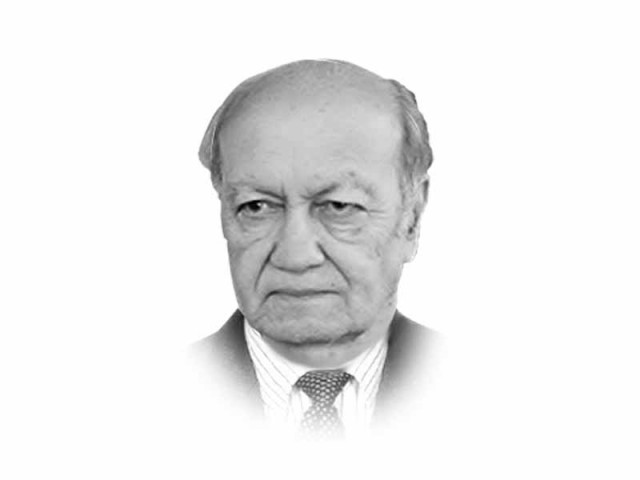Good governance makes for good politics
Key to overall recovery is to strengthen state institutions to counter militancy, economy realise its potential

The writer is a retired lieutenant general of the
Pakistan Army and served as chairman of the Pakistan Ordnance Factories Board
There were genuine expectations that the energy situation would get relatively better and the overall law and order situation would stabilise. Above all, there would be a firm commitment to lift the country from the current phase of decline by addressing the deep structural problems that require major reforms and restructuring. Instead, these weaknesses are being dealt with in an ad hoc manner in which only the symptoms are addressed to provide temporary relief that results in their recurrence in a more serious form. This is what we experienced in the form of the energy crisis and fuel shortages.
There are several other areas in which reforms are long overdue. High priority should be accorded to tax reforms and efforts should be made to improve the electoral system. Politicisation and patronage has weakened the bureaucracy and the government needs to focus on building a strong cadre of competent and honest bureaucracy.
The government, instead of undertaking the restructuring of PIA, the Pakistan Steel Mills and other public-sector enterprises, has adopted the same short-term approach of addressing symptoms that plague these institutions. The privatisation programme has failed to make any progress. Unless the government acts boldly and undertakes reforms, these organisations will continue to bleed the exchequer and keep struggling to survive.
Solving the energy crisis was supposed to be Nawaz’s main agenda. As it is a long gestation project, we have to wait until 2018 to see if the government is able to meet its declared milestones. In the interim, it should focus on improving the management of existing power, distribution and transmission sectors.
In the realm of foreign, defence and security policies, Nawaz is now resigned to the idea of conceding responsibility to the military leadership. General Raheel Sharif’s recent visits to Afghanistan, the US, the UK and China bear testimony to the military’s unabashed acceptance of this role. Nawaz’s earlier initiative to improve relations with India was sound policy. In that, he had the support of all political parties but the government’s poor performance and the crisis generated by Imran Khan’s protest movement reduced his political space in foreign and defence issues. Narendra Modi’s attitude was also a major impediment in the way of promoting dialogue with India.
To make matters worse, the civil-military divide and the handling of defence, foreign and security policies by the military creates its own dynamics that generate policies that are linear and do not have the benefit of a decision that is holistic as the civilian input is undervalued.
The military is still ambivalent on the Jamaatud Dawa and Haqqani network. What are the implications of this policy on the internal security situation and on external relations with India, the US and the Western world in general? These groups are supposed to keep pressure on India and act as a support base for the Kashmir resistance movement. If we were to draw a checklist of the gains and losses in pursuit of these aims, it would soon be evident that the balance sheet is heavily in the negative. With regard to the Lashkar-e-Jhangvi (LeJ), it was initially encouraged to target the Baloch nationalists and what we have instead is a highly organised militant group that has taken on the role of targeted killing and mass murder of Shias, and minorities as a religious ritual. Besides, it is waiting in the wings to play second fiddle to the Islamic State (IS) as and when this group makes an entry into Pakistan. The LeJ operates brazenly in Balochistan, Karachi and several other cities, and the government seems helpless and its response is pathetic.
Similarly, what efforts has the government made in rehabilitating the displaced people of North Waziristan and other agencies? Is there any attempt on its part to improve the lot of the tribal people? Even the development and rehabilitation work has been left entirely for the military to undertake.
Nawaz’s focus essentially centres round Punjab and that, too, mostly around Lahore and its vicinity. At best, the horizon would occasionally extend to Islamabad. The institutions of governance — cabinet, the cabinet committees and the national committee on security and foreign relations — remain dormant. Nacta, even after five years, has still to become fully functional despite its critical role in the fight against terror. Parliament has become a toothless organisation with little interest on the part of the ruling party or the opposition to make it more effective. The PTI’s parting kick to parliament has further diminished its role.
What is the genesis of this style of governance that is so highly personalised and coterie-centric? Several explanations could be offered for this behaviour. Primarily, it is the lack of confidence that keeps our leaders away from institutional decision-making. They feel the military hierarchy would dominate the meetings and they would have little say in it. As the military already has a monopoly over security and foreign relations, institutional decision-making would leverage rather than undermine their position.
But not all is lost. The civil society is energised and the people, despite heavy odds, are showing extraordinary resilience and the private sector is booming. The consumer market is growing against all odds and multinationals and local companies are making record profits. The key to overall recovery is to strengthen state institutions so that militancy can be countered, the economy is able to realise its potential and democratic consolidation can occur.
Published in The Express Tribune, February 4th, 2015.
Like Opinion & Editorial on Facebook, follow @ETOpEd on Twitter to receive all updates on all our daily pieces.
















COMMENTS
Comments are moderated and generally will be posted if they are on-topic and not abusive.
For more information, please see our Comments FAQ